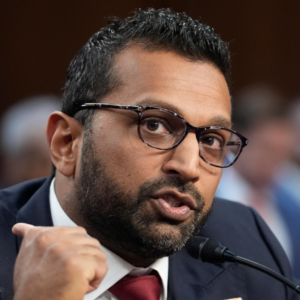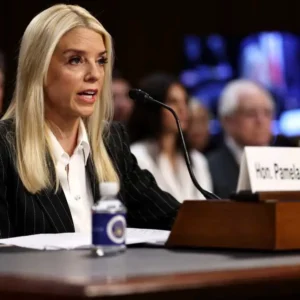In a fiery exchange on Fox News’ America Reportson Tuesday, White House Press Secretary Karoline Leavitt took aim at Senate Majority Leader Chuck Schumer for his recent claims that former President Donald Trump’s cuts to the FAA workforce contributed to a Delta Air Lines crash in Toronto. Leavitt’s response was swift and unambiguous, labeling Schumer’s remarks a “flat out lie” and insisting that his allegations are politically motivated and unfounded.
The Controversial Claim
The controversy erupted after a Delta Air Lines flight, departing from Minneapolis-Saint Paul International Airport, crash-landed at Toronto Pearson International Airport on Monday. Video footage captured the aircraft touching down, flipping onto its top, and being engulfed in flames. Miraculously, all 80 people on board survived, though 18 were injured—three of whom remain in critical condition.
Senator Schumer took to X (formerly Twitter) to blame the incident on massive layoffs at the FAA during Trump’s administration. “I’m thankful that everyone in the flight incident in Toronto that took off from Minneapolis is safe, but we keep seeing these incidents day after day. Meanwhile, Trump’s doing massive layoffs at the FAA – including safety specialists – and making our skies less and less safe,” Schumer wrote. He further argued that, even though the plane’s destination was Canada, the flight originated in Minneapolis, making the FAA responsible for ensuring safe aviation equipment.
Leavitt’s Rebuttal
Press Secretary Karoline Leavitt was quick to denounce Schumer’s claims. Speaking on America Reports alongside co-anchor John Roberts, Leavitt stated, “It’s incredibly irresponsible for Chuck Schumer to say such a thing when the investigation is still underway.” She emphasized that the crash occurred in Canadian airspace and that Canadian air traffic controllers were in charge of managing the situation.
Leavitt also clarified that no air traffic controllers were fired by Secretary Sean Duffy or the current administration. “In fact, Secretary Duffy has put great emphasis on hiring the best and the brightest air traffic controllers who want to be part of the FAA,” she argued. Leavitt further highlighted that President Trump had signed a robust executive order ensuring that federal agencies, including the FAA, adhere to merit- and skill-based hiring practices.
In a pointed remark, she noted that former President Joe Biden and Transportation Secretary Pete Buttigieg “sat on their hands when it came to aviation safety for four years.” Leavitt’s scathing rebuke concluded with a reminder to critics that past Democratic Presidents—including Bill Clinton, Barack Obama, and Joe Biden—have all championed spending cuts, a move she backed with a video clip from those administrations.
Political Fallout and Broader Implications
Schumer’s comments and Leavitt’s forceful response have ignited a broader political debate about aviation safety and federal spending. While Democrats continue to argue that workforce reductions at the FAA may compromise safety, Republicans and White House officials insist that the agency remains fully operational and that the blame lies elsewhere.
This latest clash over the Delta crash is emblematic of the polarized environment in Washington, where every incident is scrutinized through a partisan lens. As federal and Canadian authorities continue to investigate the crash, aviation experts urge caution, emphasizing that premature conclusions could hinder the search for the true cause.
What Lies Ahead
As investigations into Delta Air Lines Flight 4819 proceed, all eyes will be on the FAA and related agencies to determine the factors that contributed to the crash. Meanwhile, the political battle over blame is far from over. With both sides entrenched in their positions, the incident has become yet another flashpoint in the ongoing debate over government efficiency and safety oversight.
Leavitt’s pointed defense of the current system serves as a reminder that the focus should remain on uncovering the facts, not on partisan finger-pointing. As the investigation unfolds, the hope is that a clear, evidence-based understanding of the crash will emerge—one that can guide future policy decisions and ensure the safety of America’s skies.





